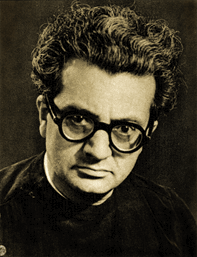Remembering the Parsi composer who wrote some of the longest-ever pieces for the piano

Kaikhosru Shapurji Sorabji wrote massive, complex compositions in early 20th century. Is that the only reason he is not widely known? By Anu Kumar
For someone who revelled in obscurity, even ensuring that his work was accessible only to the “serious and dedicated” listener, Kaikhosru Shapurji Sorabji has gained a small but dedicated following in death.
In 1992, the Canadian musicologist Paul Rapoport edited a book on the reclusive but brilliant composer-pianist-critic. Alistair Hinton, Sorabji’s literary executor and a composer himself, maintains the excellent Sorabji Archives. And in 2013, Marc-Andre Roberge, another musicologist, wrote a biography of Sorabji that is free to download.
It is an irony that would not have been lost on Sorabji.
In his lifetime, Sorabji had a reputation for being “difficult”, not least because he composed gigantic works of great complexity that made extreme demands on a pianist, who, as one admirer plaintively said, were only “ten-fingered”.
His Symphonic Variations for Piano, for instance, runs for nine hours and his Opus Clavicembalisticum for four hours. There are more works of similar lengths that have put Sorabji’s compositions on the list of long non-repetitive piano pieces.
When not composing massive works, Sorabji wrote playful pastiches based on the works of Chopin, Bizet and Rimsky-Korsakov – all among his more popular pieces. Influences came from everywhere. He composed aphoristic fragments and dreamy soulful nocturnes, including two based on the works of Persian poets Saadi and Jami, as well as pieces inspired by the writings of the ghost story author Montagu Rhodes James and Scottish poet Hugh MacDiarmid (pen name of CM Grieve).
Yet, Sorabji hated labels. As he once wrote:
“I am not a ‘modern’ composer in the inverted commas sense. I utterly and indignantly repudiate that epithet as being in any way applicable to me. I write very long, very elaborate works that are entirely alien and antipathetic to the fashionable tendencies prompted, publicized and plugged by the various ‘establishments’ revolving around this or that modish composer.
Why do I write as I do? Why did (and do) the artists-craftsmen of Iran, India, China, Byzantine-Arabic Sicily (in the first and last of which are my own ancestral roots) produce the sort of elaborate highly wrought work they did? That was their way. It is also mine. If you don’t like it, because it isn’t the present day done thing, that is just too bad, but not for me, who couldn’t care less.”
Musical journey
Kaikhosru Sorabji was born on August 14, 1892, to a Parsi father, Shapurji Sorabji, and an English mother, Madeline Mathilda Worthy. At first named Leon Dudley, he was given the Parsi name, Kaikhosru during his navjote ceremony in 1913. It was this Parsi name that he came to use and be known by.
However, the relationship between father and son was strained. Shapurji Sorabji travelled often between Bombay and England, before settling permanently in Germany, following what is rumoured to be another marriage. A trust fund was provided for Sorabji and his mother, but the abandonment had done its damage.
Musically, Sorabji was mostly self-taught, though there were certainly early influences. In the biography Opus Sorabjianum, Marc-Andre Roberge mentions Charles Arthur Trew as one of Sorabji’s teachers. Emily Edroff Smith, a friend of Sorabji’s mother, was another teacher, according to Rapoport. In yet another view, Sorabji’s first ambition was to become a music critic rather than a composer, but somehow the two went hand-in-hand.
He gave his first public performances in 1920, but it was from 1930 to 1942 that he was at his most prolific and ambitious. He wrote articles of musical criticism for New Age between 1924 and 1934, and in the next decade, for the New Music Weekly. His musical writings appeared in 1932 in a book titled Around Music, and in 1945 in a book called Mi Contra Fa: The Immoralizings of a Machiavellian Musician.
Midway through this prolific period, however, Sorabji chose to step away from the limelight, forbidding performances of his work and stopping its publication. As one story goes, he was embittered by a problematic performance of Opus Clavicembalisticum by John Tobin.
This divorce from the music world was partly related to Sorabji’s obduracy over his work. At the same time though, it was also his response to the music world’s attempts (often successful) to label a man of mixed Parsi-English heritage who was shaped by different influences. In his personal life, Sorabji was tormented by his sexuality – he lived with his partner, Norman Reginald Best, and moved with him to Dorset in 1956 – in an age when homosexuality was a prosecutable offence in Britain and elsewhere.
It took considerable persuasion from friends like Frank Holliday and Norman Gentieu and almost three decades before Sorabji relented. In 1962, Holliday recorded Sorabji playing some of his music, like in this following recording of Gulistan.
Beginning the 1970s, Sorabji’s admirers had more frequent encounters with his works.
Donald Garvelmann, a music producer and radio show host, arranged a three-hour broadcast on Sorabji’s music on a New York radio station. Around this time Sorabji met Alistair Hinton, who later set up the Sorabji Archives, meticulously detailing the Parsi-English composer’s compositions and chronologically listing the progression made on editing and publishing them.
There were also public recitals of Sorabji’s work by gifted pianists.
Yonty Solomon made the first public recital of Sorabji’s work since the 1930s. John Ogdon, Geoffrey Madge, Donna Amato performed the Toccata Sonata (the last piece Sorabji performed in Glasgow in 1936) in April this year. And Michael Habermann, a Baltimore-based pianist, made five recordings of Sorabji’s work.
It was Garvelmann who championed Habermann’s performance of Sorabji’s music, introduced Sorabji and Habermann (they had been writing letter to each other before), and called Habermann the “ideal interpreter” of Sorabji.
In an NPR recording, Habermann tells the story of how he first became acquainted with Sorabji’s work. In a Mexico City bookstore (his father worked there then), Habermann, then 17, came across Sorabji’s Fantasia Espagnole. To Habermann, the author’s name was unfamiliar, even exotic, but it was the piece that intrigued him – it looked unplayable. Habermann came back a second time when he bought the work priced at 12 pesos. He taught himself to play the piece, fascinated by its complexity (Sorabji called this his “baby piece”). From then on, he was a Sorabji convert. Not only did he seek out Sorabji’s published works, he also wrote to him.
Garvelmann listened to some tapes of Habermann playing Sorabji and it convinced him that here was Sorabji’s ideal interpreter. Habermann was meticulous and painstaking about getting every note right, spending, as Garvelmannn recalls, a week on a single measure. Though he performed several of Sorabji’s pieces, including Introito and Preludio-Corale from Sorabji’s Opus Clavicembalisticum in the early 1970s, it was in 1980 that Habermann finally visited Sorabji at his Dorset cottage.
Habermann played Djami, a bit nervous as the composer listened in rapt attention. Later, when a taxi driver arrived to take Habermann to the station, Sorabji spoke his final words of the meeting: “I have just heard my music played more marvellously than I ever imagined possible.”
Habermann composed a short piece, almost two minutes long, in a tribute to Sorabji called A la manière de Sorabji “Au clair de la lune”. In response, Sorabji sent back, as Habermann tells it, not “a moderately-sized work”, but a 93-page work dedicated to Habermann called The Golden Cockerel by Rimsky-Korsakov: Frivolous Variations with an Anarchic, Heretical, and Perverse Fugue.
Sorabji died in October 1988. But his music had been put on the world map, as Garvelmann writes, thanks to Habermann’s five recordings.
Habermann, a pianist composer in his own right, and a popular performer and teacher in Baltimore believes Sorabji is one of those composers who are interesting but will never be famous (this is what Sorabji himself would have preferred). Among his most accessible and popular pieces – those whose performances have elicited warm admiration and drawn applause – Habermann lists some nocturnes, with their special dreamy and mystical qualities and the charming, idiosyncratic shorter pieces such as pastiches from Rimsky-Korsakov’s Sadko.
As Habermann writes, Sorabji’s musical personality blended the brooding, defiant aspects of his character with something mystical and poetic. It was a persona most visible in this performance by Habermann of a piece that Sorabji wrote in dedication to his friend, the poet Hugh MacDiarmid.
Listen to Michael Habermann playing Pastiche: Hindu Merchant’s Song from Rimsky-Korsakov’s Sadko, and Gulistan and Djami.
Republished with permission from Scroll.in – https://scroll.in/magazine/818006/remembering-the-parsi-composer-who-wrote-some-of-the-longest-ever-pieces-for-the-piano





